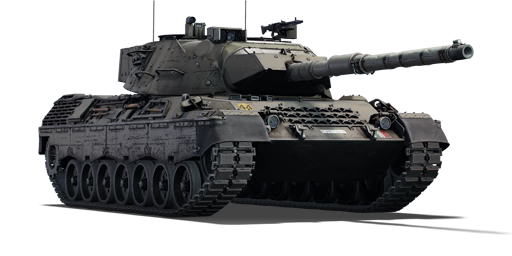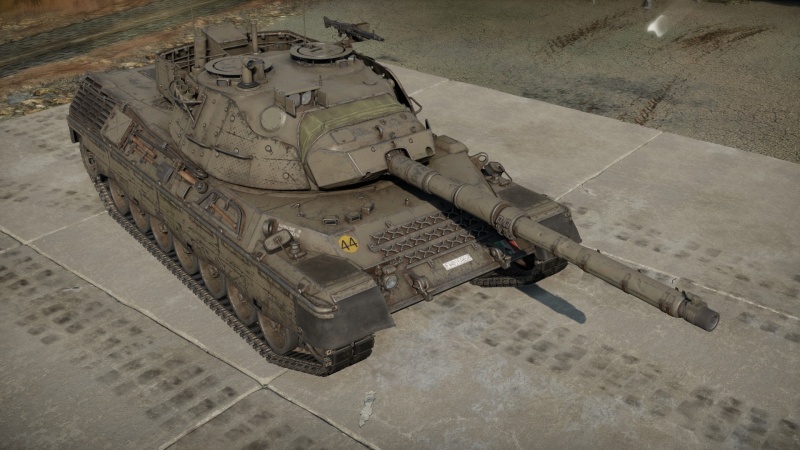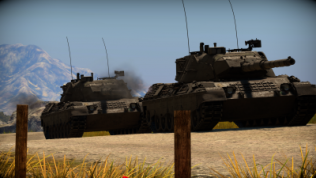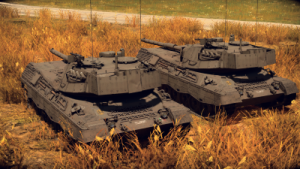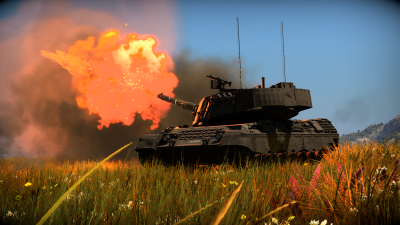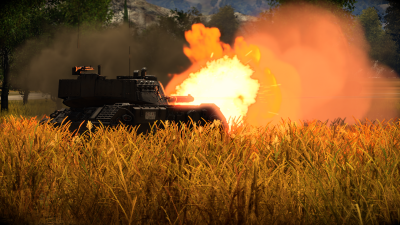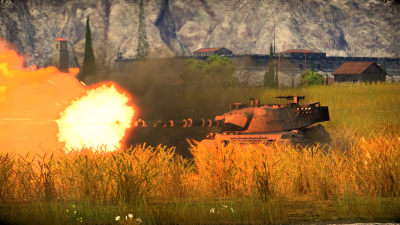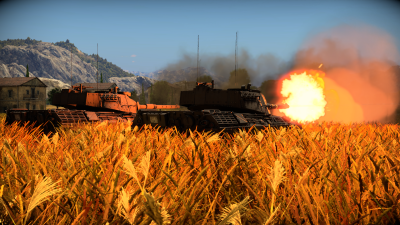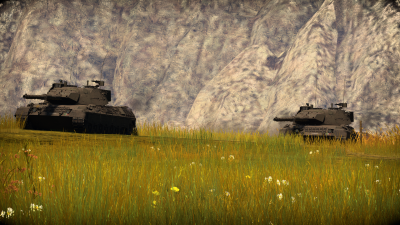Difference between revisions of "Leopard 1A5 (Italy)"
(→History) (Tag: Visual edit) |
(→Description) |
||
| (14 intermediate revisions by 4 users not shown) | |||
| Line 11: | Line 11: | ||
== Description == | == Description == | ||
<!-- ''In the description, the first part should be about the history of the creation and combat usage of the vehicle, as well as its key features. In the second part, tell the reader about the ground vehicle in the game. Insert a screenshot of the vehicle, so that if the novice player does not remember the vehicle by name, he will immediately understand what kind of vehicle the article is talking about.'' --> | <!-- ''In the description, the first part should be about the history of the creation and combat usage of the vehicle, as well as its key features. In the second part, tell the reader about the ground vehicle in the game. Insert a screenshot of the vehicle, so that if the novice player does not remember the vehicle by name, he will immediately understand what kind of vehicle the article is talking about.'' --> | ||
| − | The | + | The Leopard 1A5 was used by Italy during the last stages of the Cold War. It was actually a hybrid, consisting of a hull from the Leopard 1A2 family that Italy also used and licence-produced by OTO Melara, and the turret of the Leopard 1A5. Italy initially looked to upgrade their own Leopard 1A2s and 1A1s with an advanced Italian-made FCS, but ultimately opted to go with the Leopard 1A5 turret. These new tanks would be delivered between 1971 and 1972 followed by two batches built by OTO Melara under licence, which became one of the bulkheads of the Italian army alongside the American M60, which Italy also licence-produced. The Leopard 1A5 would mainly serve in the Italian army as part of the KFOR taskforce. |
| + | |||
| + | Introduced in [[Update "New Power"]], the Leopard 1A5 is the final evolution of the [[Leopard 1 (Family)|Leopard 1 family]], and thus offers some very competitive tools at the players' disposal. It plays very similarly to the OF-40s, the weakspots for the most part being the same. What the Leopard 1A5 is great at is being a sniper, the zoom levels together with the thermal imager allows the 1A5 to easily pick off enemies from afar. The mobility when stock sadly is not the greatest but as soon as you unlock the modules you can get to places around the battlefield at around the same speed as the rest of your team. In terms of armament the Leopard 1A5 is equipped with a NATO standard [[L7A3 (105 mm)|105 mm L7A3]] cannon. This cannon is able to fire a multitude of munitions which includes APFSDS rounds. This allows the tank to be able to destroy pretty much any tank it will face at its battle rating. Survivability-wise, the Italian 1A5 features a surprisingly useful laser warning receiver, unlike its German counterpart. However, the tank has relatively poor armour. Even IFVs will easily go through the armour, meaning you need to be a bit more strategic with what enemies you decide to engage. It has a huge ammo rack at the front of the hull, so any shot there will usually take the crew out of the battle. | ||
== General info == | == General info == | ||
| Line 26: | Line 28: | ||
| Turret || 45-120 mm ''Gun mantlet'' || 40-43 mm ''Right Side'' <br>37-45 mm ''Left Side'' || 33-52 mm ||21-65 mm | | Turret || 45-120 mm ''Gun mantlet'' || 40-43 mm ''Right Side'' <br>37-45 mm ''Left Side'' || 33-52 mm ||21-65 mm | ||
|- | |- | ||
| − | |Additional | + | |Additional Armour ||10-35 mm ''Gun Mantlet''||10-20 mm ''Turret Sides''<br>5 mm ''Sideskirts''||5-10 mm ''Turret Rear'' |
|N/A | |N/A | ||
|- | |- | ||
| Line 66: | Line 68: | ||
==== Ammunition ==== | ==== Ammunition ==== | ||
| − | { | + | {{:L7A3 (105 mm)/Ammunition|DM12, DM512, DM23, DM33}} |
| − | |||
| − | |||
| − | |||
| − | |||
| − | |||
| − | |||
| − | |||
| − | |||
| − | |||
| − | |||
| − | |||
| − | |||
| − | |||
| − | |||
| − | |||
| − | |||
| − | |||
| − | |||
| − | |||
| − | |||
| − | |||
| − | |||
| − | |||
| − | |||
| − | |||
| − | |||
| − | |||
| − | |||
| − | |||
| − | |||
| − | |||
| − | | DM12 | ||
| − | |||
| − | |||
| − | |||
| − | |||
| − | |||
| − | |||
| − | |||
| − | |||
==== [[Ammo racks]] ==== | ==== [[Ammo racks]] ==== | ||
| − | + | [[File:Ammoracks_{{PAGENAME}}.png|right|thumb|x250px|[[Ammo racks]] of the {{PAGENAME}}]] | |
| − | <!-- '''Last updated:''' --> | + | <!-- '''Last updated: 2.5.1.149''' --> |
{| class="wikitable" style="text-align:center" | {| class="wikitable" style="text-align:center" | ||
|- | |- | ||
| Line 119: | Line 81: | ||
! 4th<br>rack empty | ! 4th<br>rack empty | ||
! 5th<br>rack empty | ! 5th<br>rack empty | ||
| − | |||
! Visual<br>discrepancy | ! Visual<br>discrepancy | ||
|- | |- | ||
| − | | '''55''' || | + | | '''55''' || 52 ''(+3)'' || 49 ''(+6)'' || 10 ''(+45)'' || 7 ''(+48)'' || 1 ''(+54)'' || No |
|- | |- | ||
|} | |} | ||
| + | |||
| + | * Racks 4 and 5 are first stage ammo racks. | ||
=== Machine guns === | === Machine guns === | ||
| Line 130: | Line 93: | ||
{{Specs-Tank-Weapon|3}} | {{Specs-Tank-Weapon|3}} | ||
<!-- ''Offensive and anti-aircraft machine guns not only allow you to fight some aircraft but also are effective against lightly armoured vehicles. Evaluate machine guns and give recommendations on its use.'' --> | <!-- ''Offensive and anti-aircraft machine guns not only allow you to fight some aircraft but also are effective against lightly armoured vehicles. Evaluate machine guns and give recommendations on its use.'' --> | ||
| − | {{main| | + | {{main|Beretta MG42/59 (7.62 mm)}} |
{| class="wikitable" style="text-align:center" width="50%" | {| class="wikitable" style="text-align:center" width="50%" | ||
|- | |- | ||
| − | ! colspan="5" | [[ | + | ! colspan="5" | [[Beretta MG42/59 (7.62 mm)|7.62 mm Beretta MG42/59]] |
|- | |- | ||
! Mount !! Capacity (Belt) !! Fire rate !! Vertical !! Horizontal | ! Mount !! Capacity (Belt) !! Fire rate !! Vertical !! Horizontal | ||
|- | |- | ||
| − | | Coaxial || 4, | + | | Coaxial || 4,600 (200) || 801 || N/A || N/A |
|- | |- | ||
| − | | Pintle || 2,000 ( | + | | Pintle || 2,000 (200) || 801 || -8°/+20° || ±120° |
|- | |- | ||
|} | |} | ||
| Line 164: | Line 127: | ||
'''Cons:''' | '''Cons:''' | ||
| − | * Poor survivability, most enemy fire will usually destroy you in 1 shot | + | * Poor survivability, most enemy fire will usually destroy you in 1 shot |
| − | |||
* Big target, will likely stick out | * Big target, will likely stick out | ||
== History == | == History == | ||
<!-- ''Describe the history of the creation and combat usage of the vehicle in more detail than in the introduction. If the historical reference turns out to be too long, take it to a separate article, taking a link to the article about the vehicle and adding a block "/History" (example: <nowiki>https://wiki.warthunder.com/(Vehicle-name)/History</nowiki>) and add a link to it here using the <code>main</code> template. Be sure to reference text and sources by using <code><nowiki><ref></ref></nowiki></code>, as well as adding them at the end of the article with <code><nowiki><references /></nowiki></code>. This section may also include the vehicle's dev blog entry (if applicable) and the in-game encyclopedia description (under <code><nowiki>=== In-game description ===</nowiki></code>, also if applicable).'' --> | <!-- ''Describe the history of the creation and combat usage of the vehicle in more detail than in the introduction. If the historical reference turns out to be too long, take it to a separate article, taking a link to the article about the vehicle and adding a block "/History" (example: <nowiki>https://wiki.warthunder.com/(Vehicle-name)/History</nowiki>) and add a link to it here using the <code>main</code> template. Be sure to reference text and sources by using <code><nowiki><ref></ref></nowiki></code>, as well as adding them at the end of the article with <code><nowiki><references /></nowiki></code>. This section may also include the vehicle's dev blog entry (if applicable) and the in-game encyclopedia description (under <code><nowiki>=== In-game description ===</nowiki></code>, also if applicable).'' --> | ||
| − | |||
| − | The story of the Italian 1A5 began during the late stages of the | + | The story of the Italian Leopard 1A5 began during the late stages of the Cold War. Italy equipped several variants of the Leopard tank, first a small batch of Leopard 1A1s, which were then upgraded to Leopard 1A2s. They would be extensively used and at one point a study was conducted which aimed to equip the Leopard 1A1 with the Italian-made "Thetis" thermal imager system to evaluate its implementation on the Italian army Leopard tanks. Only a singular prototype was completed, this was likely due to the Italian army setting its eyes on the more interesting Leopard 1A5, which would also come with a thermal imaging system as standard. Thus, the final standard version of the Leopard 1 was the A5, obtained by extensively modifying many vehicles belonging to previous versions. |
| + | [[File:Leopard 1A5 (Italy) convoy.png|thumb|316x316px|Leopard 1A5 in a convoy]] | ||
| + | In order to modernize the tanks already in service, the Italian Army acquired some versions of Leopard 1A5 turrets from Germany, later installed on Leopard 1A2 hulls already in service, which would be plentiful in general. Some modifications had to be done on the Leopard 1A2 hulls however, as it wasn't as simple as installing the turret on the hull. For this, the Italian army had put the Gorizian Mechanical Workshops (COMG), the Fiore company (FIREMA) and the factories of the Army of Nola and Bologna, in charge to make a series of improvements on the Leopard 1A2, such as the suspension system. In fact, in order to compensate for the weight increase of about 2 tons, some of the more important modifications were added to the hull, the most important of which concerned: replacing the deflection roller with one of smaller dimensions and its repositioning more in above, the replacement of the first two rollers on the suspensions carriers of the volute springs with end-of-stroke buffers, the strengthening of the torsion bars, the adoption of a new maintenance-free track tensioner, and lastly but not least, the predisposition of the application of bulkheads track cover with brand new fenders. These changes were made to a number of hulls (202) higher than the 120 units foreseen for the transformation in the A5 version, perhaps in anticipation of further acquisitions of new turrets, then faded; the extra hulls therefore kept the original turret. These new tanks would be delivered between 1971 and 1972 followed by two batches built by OTO Melara under licence. | ||
| + | |||
| + | The turret of the Leopard 1A5 is immediately distinguished by the application of the additional passive armour designed by Blohm und Voss, adopted for the first time in Germany in 1975 on the A1A1 subversion; the protection extends over 360° from the 1st shield of the gun to the rear rack for the turret equipment consists of eleven armoured panels with rubber coatings spaced about 10 cm from the main armour by the use of bolts, mounted on elastic supports. Thanks to a zip opening on the additional armour, it was still possible to use the crewman's circular hatch to load ammunition and eject shells that have already been fired. | ||
| + | [[File:Leopard 1A5 ready to be demolished.png|thumb|Leopard 1A5 ready to be demolished]] | ||
| + | What made the Leopard 1A5 more potent and distinct from the previous versions was the additions of a night imaging and thermal imaging camera, laser rangefinder, laser warning system (only present on the Italian 1A5) and a electro-hydraulic stabilization system for its armament. Due to all these new additions, such as the installation of new firing systems and stabilization systems, it would cause a reduction to 55 transportable shells for the 105 mm cannon. Typically on board the Italian army would bring 27 APDS or APFSDS, 16 HEAT, 6 HESH, and 6 WP. The Leopard 1A5's service in the Italian army would mainly be during the war in the Balkans, in which Italy took part in the various peacekeeping missions, but ultimately they never saw action. Most of the Leopard 1A5s would quickly be put out of service during the late 1990s as from 1995, the new Italian-made C1 Ariete MBT would be delivered. All the Leopard 1A5s would then either be turned into static displays or sent to the Italian military graveyard at Lenta. There were plans to sell them to an undisclosed South American country however that never went anywhere. | ||
== Media == | == Media == | ||
<!-- ''Excellent additions to the article would be video guides, screenshots from the game, and photos.'' --> | <!-- ''Excellent additions to the article would be video guides, screenshots from the game, and photos.'' --> | ||
| − | + | ||
| + | ;Skins | ||
| + | |||
| + | * [https://live.warthunder.com/feed/camouflages/?vehicle=it_leopard_1a5 Skins and camouflages for the {{PAGENAME}} from live.warthunder.com.] | ||
| + | |||
| + | ;Images | ||
| + | <gallery mode="packed-hover" heights="150"> | ||
| + | File:Leopard 1A5 (Italy) Fire (1).png| | ||
| + | File:Leopard 1A5 (Italy) Fire (2).png| | ||
| + | File:Leopard 1A5 (Italy) Fire (3).png| | ||
| + | File:Leopard 1A5 (Italy) Fire (4) .png| | ||
| + | File:Leopard 1A5 (Italy) while moving up a hill.png| | ||
| + | </gallery> | ||
== See also == | == See also == | ||
| Line 182: | Line 161: | ||
* ''reference to the series of the vehicles;'' | * ''reference to the series of the vehicles;'' | ||
* ''links to approximate analogues of other nations and research trees.'' --> | * ''links to approximate analogues of other nations and research trees.'' --> | ||
| − | |||
| − | + | ;[[Leopard 1 (Family)|Related development]] | |
| − | * | + | * [[Leopard 1A5]] |
== External links == | == External links == | ||
| Line 191: | Line 169: | ||
* ''topic on the official game forum;'' | * ''topic on the official game forum;'' | ||
* ''other literature.'' --> | * ''other literature.'' --> | ||
| − | |||
| − | * | + | * [http://www.ferreamole.it/images/leopard1a5/leopard1a5_01.htm <nowiki>[FERREA MOLE]</nowiki> Leopard 1A5] (in Italian) |
| − | * | + | * [http://www.army-guide.com/eng/product234.html <nowiki>[Army Guide]</nowiki> Leopard 1A5] |
| + | {{TankManufacturer KMW}} | ||
{{Italy medium tanks}} | {{Italy medium tanks}} | ||
Latest revision as of 16:58, 22 July 2023
| This page is about the medium tank Leopard 1A5 (Italy). For other versions, see Leopard 1 (Family). |
Contents
Description
The Leopard 1A5 was used by Italy during the last stages of the Cold War. It was actually a hybrid, consisting of a hull from the Leopard 1A2 family that Italy also used and licence-produced by OTO Melara, and the turret of the Leopard 1A5. Italy initially looked to upgrade their own Leopard 1A2s and 1A1s with an advanced Italian-made FCS, but ultimately opted to go with the Leopard 1A5 turret. These new tanks would be delivered between 1971 and 1972 followed by two batches built by OTO Melara under licence, which became one of the bulkheads of the Italian army alongside the American M60, which Italy also licence-produced. The Leopard 1A5 would mainly serve in the Italian army as part of the KFOR taskforce.
Introduced in Update "New Power", the Leopard 1A5 is the final evolution of the Leopard 1 family, and thus offers some very competitive tools at the players' disposal. It plays very similarly to the OF-40s, the weakspots for the most part being the same. What the Leopard 1A5 is great at is being a sniper, the zoom levels together with the thermal imager allows the 1A5 to easily pick off enemies from afar. The mobility when stock sadly is not the greatest but as soon as you unlock the modules you can get to places around the battlefield at around the same speed as the rest of your team. In terms of armament the Leopard 1A5 is equipped with a NATO standard 105 mm L7A3 cannon. This cannon is able to fire a multitude of munitions which includes APFSDS rounds. This allows the tank to be able to destroy pretty much any tank it will face at its battle rating. Survivability-wise, the Italian 1A5 features a surprisingly useful laser warning receiver, unlike its German counterpart. However, the tank has relatively poor armour. Even IFVs will easily go through the armour, meaning you need to be a bit more strategic with what enemies you decide to engage. It has a huge ammo rack at the front of the hull, so any shot there will usually take the crew out of the battle.
General info
Survivability and armour
| Armour | Front (Slope angle) | Sides | Rear | Roof |
|---|---|---|---|---|
| Hull | 70 mm (60°) Upper Glacis 50 mm (50°) Lower Glacis |
35 mm Upper 30 mm Lower |
25 mm | 15-30 mm |
| Turret | 45-120 mm Gun mantlet | 40-43 mm Right Side 37-45 mm Left Side |
33-52 mm | 21-65 mm |
| Additional Armour | 10-35 mm Gun Mantlet | 10-20 mm Turret Sides 5 mm Sideskirts |
5-10 mm Turret Rear | N/A |
The Leopard 1A5 is a further development of the A1A1 specification of the Leopard MBT. That being said, it does not differ much from its predecessor in terms of armour. The Leopard 1A5 prioritizes firepower and mobility over the survivability of the tank. As such, it has no notable modules or layout that offer advanced survivability. The frontal armour is reliable against APDS and AP rounds from many of the autocannons found on IFVs at the rank but struggles against chemical and armour-piercing rounds from dedicated tanks and tank destroyers. The side and rear armour however, is a different story. Offering only 30-60 mm of armour over most of the surface, it can be penetrated by most rounds fired from cannon calibre weapons. Any shot from the side will penetrate the tank and have the potential to destroy it in one shot. This is due to three of the four crew members in the tank being situated in the turret. This is the major drawback of the Leopard 1 series tanks. A single shot has the capability to destroy the Leopard. As such, it requires a slightly more careful and patient play style.
Mobility
| Game Mode | Max Speed (km/h) | Weight (tons) | Engine power (horsepower) | Power-to-weight ratio (hp/ton) | |||
|---|---|---|---|---|---|---|---|
| Forward | Reverse | Stock | Upgraded | Stock | Upgraded | ||
| Arcade | 73 | 28 | 42.5 | 1,286 | 1,584 | 30.26 | 37.27 |
| Realistic | 66 | 26 | 734 | 830 | 17.27 | 19.53 | |
Modifications and economy
Armaments
Main armament
| 105 mm L7A3 | Turret rotation speed (°/s) | Reloading rate (seconds) | |||||||||||
|---|---|---|---|---|---|---|---|---|---|---|---|---|---|
| Mode | Capacity | Vertical | Horizontal | Stabilizer | Stock | Upgraded | Full | Expert | Aced | Stock | Full | Expert | Aced |
| Arcade | 55 | -9°/+20° | ±180° | Two-plane | 22.8 | 31.6 | 38.4 | 42.5 | 45.2 | 8.71 | 7.70 | 7.10 | 6.70 |
| Realistic | 14.3 | 16.8 | 20.4 | 22.6 | 24.0 | ||||||||
Ammunition
| Penetration statistics | |||||||
|---|---|---|---|---|---|---|---|
| Ammunition | Type of warhead |
Penetration @ 0° Angle of Attack (mm) | |||||
| 10 m | 100 m | 500 m | 1,000 m | 1,500 m | 2,000 m | ||
| DM12 | HEATFS | 400 | 400 | 400 | 400 | 400 | 400 |
| DM512 | HESH | 127 | 127 | 127 | 127 | 127 | 127 |
| DM23 | APFSDS | 337 | 335 | 330 | 322 | 314 | 306 |
| DM33 | APFSDS | 408 | 405 | 398 | 389 | 379 | 370 |
| Shell details | ||||||||||||
|---|---|---|---|---|---|---|---|---|---|---|---|---|
| Ammunition | Type of warhead |
Velocity (m/s) |
Projectile mass (kg) |
Fuse delay (m) |
Fuse sensitivity (mm) |
Explosive mass (TNT equivalent) (kg) |
Ricochet | |||||
| 0% | 50% | 100% | ||||||||||
| DM12 | HEATFS | 1,174 | 10.5 | 0.05 | 0.1 | 1.27 | 65° | 72° | 77° | |||
| DM512 | HESH | 732 | 11.2 | 0.1 | 4 | 4.31 | 73° | 77° | 80° | |||
| DM23 | APFSDS | 1,455 | 4.2 | - | - | - | 78° | 80° | 81° | |||
| DM33 | APFSDS | 1,455 | 3.79 | - | - | - | 78° | 80° | 81° | |||
Ammo racks
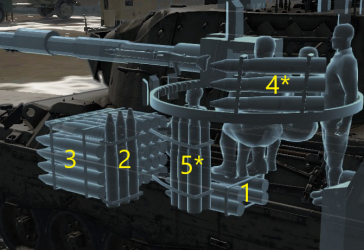
| Full ammo |
1st rack empty |
2nd rack empty |
3rd rack empty |
4th rack empty |
5th rack empty |
Visual discrepancy |
|---|---|---|---|---|---|---|
| 55 | 52 (+3) | 49 (+6) | 10 (+45) | 7 (+48) | 1 (+54) | No |
- Racks 4 and 5 are first stage ammo racks.
Machine guns
| 7.62 mm Beretta MG42/59 | ||||
|---|---|---|---|---|
| Mount | Capacity (Belt) | Fire rate | Vertical | Horizontal |
| Coaxial | 4,600 (200) | 801 | N/A | N/A |
| Pintle | 2,000 (200) | 801 | -8°/+20° | ±120° |
Usage in battles
The Italian Leopard 1A5 can be a truly powerful vehicle when used in the right hands. For people who are going through the stock grind, it is recommended that you play a support role, until you get access to the APFSDS round. The Leopard 1A5 sadly is not very armoured, compared to other vehicles it will face, the main weak spots are the hull and the sides. So for people who have just picked it up, either play as a support, sniper or flank, as the stock HEAT round is not very good to deal frontally with most of the enemies.
One thing the Leopard 1A5 has that its German counterpart doesn't is a laser warning receiver, although you'll have to research it, this tool can prove to be a very useful modification for the tank as it will notify you whenever an enemy vehicle is lasing you, such as a helicopter. The LWR should give you enough time to react and either use your smoke discharges or quickly move to cover to avoid getting destroyed. Once you have gone through and researched most of its important modifications, such as the APFSDS round and the engine upgrade, you should be ready to play a more offensive role.
A good point you could take advantage of is your speed, your engine will be decent enough that you'll usually be with or ahead of your team most of the time. Use your speed at the start of matches to get to positions that enemies might not expect you to be in, which might guarantee you the first shot in most engagements. Your main gun is also very good at long ranges, so it is also not a bad idea to keep your distance, since you cannot count on your survivability. In night battles thanks to your thermal imager, you are able to easily gain an advantage compared to most of your enemies who might only have access to night vision only. This also should apply for all game modes, be aware that in Arcade battles the enemies are able to see your weak spots when they aim at you, so keep that in mind if you decide to go hull-down as an experienced player might just go for a different module, such as your cannon barrel or breech, and finish you off slowly.
Pros and cons
Pros:
- Has access to a thermal imager
- Potent APFSDS round, can deal with the majority of targets you'll encounter
- Decent mobility, isn't the fastest but isn't the slowest either
Cons:
- Poor survivability, most enemy fire will usually destroy you in 1 shot
- Big target, will likely stick out
History
The story of the Italian Leopard 1A5 began during the late stages of the Cold War. Italy equipped several variants of the Leopard tank, first a small batch of Leopard 1A1s, which were then upgraded to Leopard 1A2s. They would be extensively used and at one point a study was conducted which aimed to equip the Leopard 1A1 with the Italian-made "Thetis" thermal imager system to evaluate its implementation on the Italian army Leopard tanks. Only a singular prototype was completed, this was likely due to the Italian army setting its eyes on the more interesting Leopard 1A5, which would also come with a thermal imaging system as standard. Thus, the final standard version of the Leopard 1 was the A5, obtained by extensively modifying many vehicles belonging to previous versions.
In order to modernize the tanks already in service, the Italian Army acquired some versions of Leopard 1A5 turrets from Germany, later installed on Leopard 1A2 hulls already in service, which would be plentiful in general. Some modifications had to be done on the Leopard 1A2 hulls however, as it wasn't as simple as installing the turret on the hull. For this, the Italian army had put the Gorizian Mechanical Workshops (COMG), the Fiore company (FIREMA) and the factories of the Army of Nola and Bologna, in charge to make a series of improvements on the Leopard 1A2, such as the suspension system. In fact, in order to compensate for the weight increase of about 2 tons, some of the more important modifications were added to the hull, the most important of which concerned: replacing the deflection roller with one of smaller dimensions and its repositioning more in above, the replacement of the first two rollers on the suspensions carriers of the volute springs with end-of-stroke buffers, the strengthening of the torsion bars, the adoption of a new maintenance-free track tensioner, and lastly but not least, the predisposition of the application of bulkheads track cover with brand new fenders. These changes were made to a number of hulls (202) higher than the 120 units foreseen for the transformation in the A5 version, perhaps in anticipation of further acquisitions of new turrets, then faded; the extra hulls therefore kept the original turret. These new tanks would be delivered between 1971 and 1972 followed by two batches built by OTO Melara under licence.
The turret of the Leopard 1A5 is immediately distinguished by the application of the additional passive armour designed by Blohm und Voss, adopted for the first time in Germany in 1975 on the A1A1 subversion; the protection extends over 360° from the 1st shield of the gun to the rear rack for the turret equipment consists of eleven armoured panels with rubber coatings spaced about 10 cm from the main armour by the use of bolts, mounted on elastic supports. Thanks to a zip opening on the additional armour, it was still possible to use the crewman's circular hatch to load ammunition and eject shells that have already been fired.
What made the Leopard 1A5 more potent and distinct from the previous versions was the additions of a night imaging and thermal imaging camera, laser rangefinder, laser warning system (only present on the Italian 1A5) and a electro-hydraulic stabilization system for its armament. Due to all these new additions, such as the installation of new firing systems and stabilization systems, it would cause a reduction to 55 transportable shells for the 105 mm cannon. Typically on board the Italian army would bring 27 APDS or APFSDS, 16 HEAT, 6 HESH, and 6 WP. The Leopard 1A5's service in the Italian army would mainly be during the war in the Balkans, in which Italy took part in the various peacekeeping missions, but ultimately they never saw action. Most of the Leopard 1A5s would quickly be put out of service during the late 1990s as from 1995, the new Italian-made C1 Ariete MBT would be delivered. All the Leopard 1A5s would then either be turned into static displays or sent to the Italian military graveyard at Lenta. There were plans to sell them to an undisclosed South American country however that never went anywhere.
Media
- Skins
- Images
See also
External links
- [FERREA MOLE] Leopard 1A5 (in Italian)
- [Army Guide] Leopard 1A5
| Krauss-Maffei Wegmann (KMW) | |
|---|---|
| MBTs | |
| Leopard 1 | Leopard I · Leopard A1A1 · Leopard A1A1 (L/44) · Leopard 1A5 · C2A1 |
| Leopard 2 | PT-16/T14 mod. · Leopard 2K · Leopard 2A4 · Leopard 2 (PzBtl 123) · Leopard 2A4M · Leopard 2 PL · Leopard 2A5 · Leopard 2 PSO · Leopard 2A6 · Leopard 2A7V |
| KPz-70 | KPz-70* |
| *By the Deutsche Entwicklungsgesellschaft consortium, in collaboration with the General Motors Company. | |
| IFVs | PUMA |
| SPAAs | Gepard · Gepard 1A2 |
| Export | |
| Leopard 1 | ▄Leopard 1A5 · Leopard 1A5NO2 |
| Leopard 2 | Strv 121 · ▄Leopard 2A4 · ◔Leopard 2A4 · ▄Leopard 2A6 · Leopard 2A7HU |
| See Also | BAE Systems AB |
| Italy medium tanks | |
|---|---|
| Italy | |
| M13/40 | M13/40 (I) · M13/40 (II) · M13/40 (III) |
| M14/41 | M14/41 · M14/41 (47/40) |
| M15/42 | M15/42 |
| M16/43 | Celere Sahariano |
| P26/40 | P40 · P40 "G.C. Leoncello" |
| OF-40 | OF-40 · OF-40 Mk.2A · OF-40 (MTCA) |
| Ariete | Ariete (P) · Ariete · Ariete PSO · Ariete AMV |
| Germany | ▄Pz.III N · ▄Pz.IV G · ▄Leopard 1A5 |
| Allied powers | ▄Sherman I Composito · Sherman Ic · ▄Sherman Vc · ▄Sherman V · M26 "D.C.Ariete" · M26A1 · M47 (105/55) · M60A1 "D.C.Ariete" |
| Hungary | |
| Turán | Turan I · Turan II · Turan III |
| Germany | ◔Leopard 2A4 · Leopard 2A7HU |
| USSR | ◔T-72M1 |


